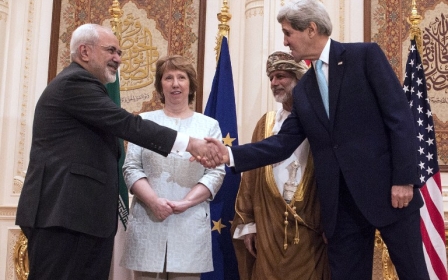Zarif, Kerry to join nuclear talks in Geneva

Iranian Foreign Minister Mohammad Javad Zarif and top US diplomat John Kerry will meet in Geneva this week for talks on Tehran's nuclear programme, an Iranian official said Thursday.
Iran and world powers are trying to strike a deal that would prevent Tehran from developing a nuclear bomb, a goal it denies having, in return for an easing of punishing economic sanctions.
Zarif and Kerry will hold two days of discussions from Sunday after their diplomats begin bilateral talks on Friday, Iran's deputy foreign minister Abbas Araghchi said.
"After four days of bilateral discussions between the Iranian and US nuclear delegations, they could continue with the participation of all members of the P5+1," Araghchi was quoted as saying by the official IRNA news agency.
He was referring to Britain, China, France, Germany, Russia and the United States, which are seeking to thrash out a complex deal with Iran.
Washington said this week that the European Union's deputy foreign policy chief Helga Schmid would also join the US-Iranian talks.
Two deadlines for a permanent agreement have been missed since a November 2013 interim deal.
Negotiators are now working toward reaching a political framework by March 31, with the final technical details to be laid out in a comprehensive accord by June 30.
Zarif has met multiple times with Kerry, most recently in Munich earlier this month on the sidelines of a global security conference.
Iran says its nuclear programme is for peaceful energy purposes.
Khamenei to counter sanctions by cutting gas to Europe
Meanwhile, Iran's supreme leader said on Wednesday that Tehran may counter western sanctions by cutting back natural gas exports to Europe.
"If the weapon of sanctions is used against the people of Iran, they will impose sanctions in return," said Ayatollah Ali Khamenei, according to the office of the supreme leader.
"Having the largest natural gas reserves in the world, Iran can impose sanctions on Europe and the world by using the natural gas they need," he added.
Iran has with more than 33 trillion cubic meters of gas reserves, according to 2014 BP Statistical Review, while it produced 167 billion cubic meters of gas in 2013.
Turkey imports around 10 billion cubic meters of gas from Iran annually, Turkish Petroleum Pipeline Corporation data shows.
However, Iran's production volume declined in the last few years as international sanctions led to delays in exploration and production projects, according to the US Energy Information Administration.
Stay informed with MEE's newsletters
Sign up to get the latest alerts, insights and analysis, starting with Turkey Unpacked
Middle East Eye delivers independent and unrivalled coverage and analysis of the Middle East, North Africa and beyond. To learn more about republishing this content and the associated fees, please fill out this form. More about MEE can be found here.




